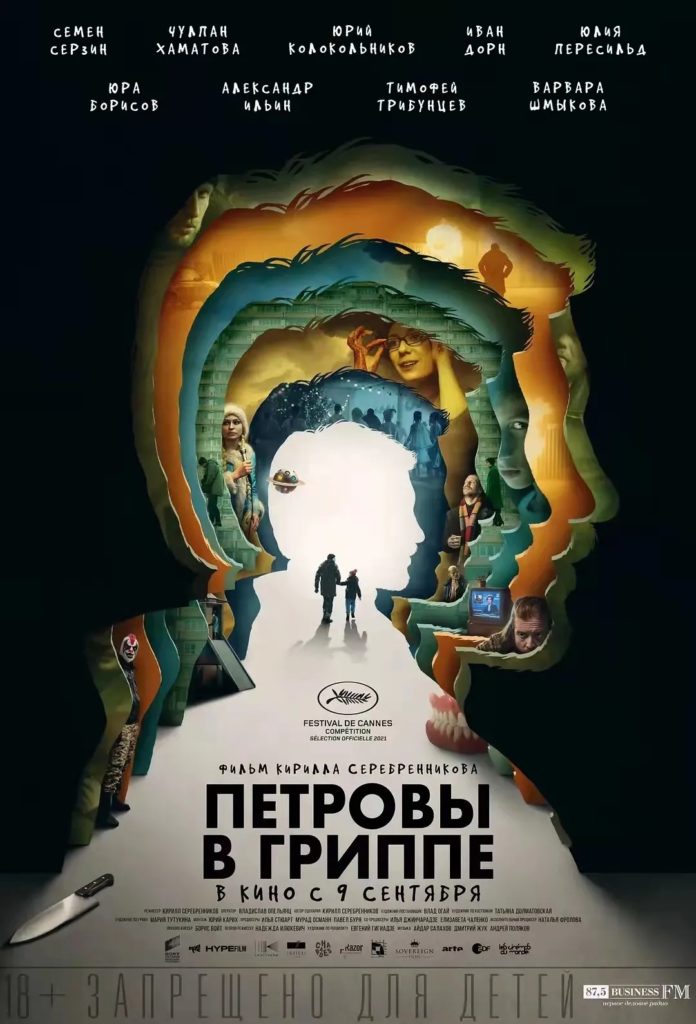《彼得罗夫的流感》是基里尔·谢列布连尼科夫的新片,于今年戛纳电影节上首映。它虽然没有获得任何主要获奖,但被独立CST协会授予了最佳电影摄影Vulcan奖。
在观看这部令人眩晕的过山车式电影的时候,你常常会觉得自己见证了一部史诗般的名作雏形。尽管事后,你的记忆可能会像影片中描述的后苏联叶卡捷琳堡的雾状街道那样模糊。
这部电影是由小说《流感中的彼得罗夫》(Petrovy v grippe)改编而成。表面上看,故事围绕主人公彼得罗夫和他的妻子、儿子展开,他们在圣诞节期间都患上了严重的流感;而彼得罗夫饱受流感所扰,发烧愈演愈烈。
随后,他遇到了一个叫Igor的人,他在家里诱发了一种幻觉状态,所有的人都开始把现实和非现实混为一谈。影片将我们带入彼得罗夫心中地狱最底层的境界,有时是想象的,有时是真实的,有时两者皆有。
基里尔·谢列布连尼科夫摄制这部影片时像着了魔。影片的每个场景都散发着原始的阳刚之气,但有时也会对作品造成损害:这种棒槌式的方法使《彼得罗夫的流感》充满了娱乐性,但也很难在任何情况下与之联系起来。
导演的戏剧背景在电影中得到了充分的展示,在无数次的镜头转换中,布景在我们眼前变幻或被拆毁。前一秒,我们看到一个图书管理员妈妈变成了超级英雄,用堪比美国队长的动作殴打她周围的人;后一秒,我们就坐进了一辆看起来像圣诞树内部式的灵车。这极具美感,但令人迷惑。
不幸的是,这部电影的任何内容都是很难让人理解的。前面提到的场景转换虽然是以非凡的技巧完成的,但在人物层面和情节设置上却都缺少连接。当然,这种混乱的气氛是故意制造的,因为我们应该陷入彼得罗夫那狂热的精神状态,他的体温越高,思维就越混乱。
然而,电影模仿故事的这种时尚方式,并不能为没给观众交代清楚故事背景提供借口。换句话说:如果你想把爱丽丝送进兔子洞,你需要确保你的故事先从地上开始。
《彼得罗夫的流感》像是一个谜题。在观看这部影片的时候,影评者在有些时刻觉得自己正在观看一部杰作:一个延长的黑白镜头,由于其在影片中的包含性,提供了一个由技术大师支持但不被其淹没的精心叙述。
但在其他时刻,它给人的感觉是玩世不恭的节日电影,一部令人震惊和敬畏的作品:踩下油门踏板,永不回头。
从主题上看,人们可以认为它是关于死亡的,但同样,这些主题并没有原汁原味地呈现出来。当我读到彼得罗夫的《流感》是基于阿列克谢-萨尔尼科夫的小说改编时,我甚至感到惊讶,因为我半信半疑地认为它是基于高度风格化的图形小说,并由一些痴呆的头脑以迷幻的奢华方式绘制,然后翻译到屏幕。
最后,虽然这部电影没有在人的嘴里留下令人不快的味道,但它像水壶里的蒸汽一样蒸发了,消散了,无法给人留下持久的印象。话说回来,这种遗忘可能是我们终于从流感中恢复过来的标志,我们已经准备好观看更多令人难忘的电影。

影评人简介
贝尔纳多·莱特(Bernardo Leyte),常驻巴黎的电影制作人。 他在西班牙、德国和英国长大,毕业于伦敦电影学院,目前担任导演。 他是一位充满热情的影迷,他所观看的电影囊括各种类型,从他的偶像斯坦利·库布里克(Stanley Kubrick)和安德烈·塔可夫斯基(Andrei Tarkovsky)的電影,到超级英雄、恐怖片、动漫等。

PETROV’s FLU REVIEW
Petrov’s Flu, the new film by Kirill Serebrennikov, was released this year at the Cannes film festival, where it didn’t win in the main categories, but was awarded the Vulcan award for best cinematography by the independent CST association. Watching this vertiginous rollercoaster of cinematic excess, you’ll often feel like you’re seeing the makings of an epic prestige picture although, in the aftermath, your memory may be as hazy as the foggy streets of post-Soviet Yekaterinburg depicted in the film.
The film is an adaptation of the novel The Petrovs In and Around the Flu (Petrovy v grippe) . Ostensibly, the story revolves around Petrov, the protagonist, and his wife and son, who all come down with a heavy flu during the Christmas season. As the flu takes its toll on Petrov and the fever rises, he meets a man named Igor, who induces a hallucinatory state in the family, all of whom begin to muddle reality with unreality. The film takes us down to the lowest realms of the Hades of Petrov’s mind, sometimes imagined, sometimes real, sometimes both.
Serebrennikov directs the film like a man possessed. Every scene of the film exudes raw masculine power, at moments to the detriment of the piece: this sledgehammer approach makes Petrov’s Flu thoroughly entertaining, but also hard to connect with at any given instance. The director’s theatre background is on full display here, with countless in-camera transitions where the sets mutate or are torn down in front of our eyes. One moment, we are seeing a librarian mom turn into a superhero and beat up everyone around her with moves worthy of Captain America; the next, we are riding inside a hearse that looks like the interior of a Christmas tree. It’s beautiful, but disorienting.
Unfortunately for the film, it’s hard to make sense out of any of it. The aforementioned scene transitions are pulled off with remarkable skill, but there’s connective tissue missing, both at the character level and in the plotting. The confusing atmosphere is created on purpose, of course, as we are supposed to be plunged into Petrov’s own feverish mental state, more scattershot the more his temperature rises. However, this stylish way of the film’s form imitating its story does not excuse the utter lack of context given for the audience to have a grasp of what is going on. To put it in other words: if you want to send Alice down the rabbit hole, you need to make sure you begin your story above ground first.
Petrov’s Flu is a conundrum. There were moments watching the film when this critic though he was experiencing a masterpiece. There is an extended sequence in black and white that, due to its contained nature within the film, delivers a well-told narrative supported by technical mastery but not drowned out by it. But, other times, it feels cynically engineered to be an award-winning festival picture, a work of shock and awe flooring the accelerator pedal and never looking back. Thematically, one can assume it’s about death, but again, the themes do not come across organically. I was even surprised when I read that Petrov’s Flu is based on a novel by Alexei Salnikov, because I half expected it to be based on a highly stylised graphic novel, drawn with psychedelic lavishness by some demented mind and then translated to the screen. In the end, though the film doesn’t leave a sour taste in one’s mouth, it evaporates like steam from a kettle and flies away, unable to leave a lasting impression. But, then again, this forgetfulness may be a sign that we have finally recovered from the flu and we are ready to watch more memorable movies.

About the Author
Bernardo Leyte (Vigo, Spain) is a Paris-based filmmaker. He grew up in Spain, Germany and the UK, graduating as a director from the London Film School. He is a passionate cinephile whose eclectic film playlist includes a bit of everything, from his idols, Kubrick and Tarkovsky, to superheroes, horror, anime and everything in between.

